|
|
|
Sort Order |
|
|
|
Items / Page
|
|
|
|
|
|
|
| Srl | Item |
| 1 |
ID:
178139
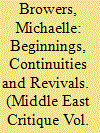

|
|
|
|
|
| Summary/Abstract |
This article examines some of the first translations of Gramsci into Arabic by young, New Left figures associated with a short-lived group called “Socialist Lebanon.” Thinking à la Edward Said about the undertaking of translations of ideas from one context to another and one language to another as a potentially productive act of beginning, I argue that these first translations, undertaken as part of a revolutionary praxis of young, militant intellectuals, not only reveal some of the limitations and possibilities in the development of a Gramscian analysis of Lebanese politics. Rather, their efforts were central to the formation of a New Arab Left and the strands of those beginnings not only are detected in the later work of several of these activist-translators, even after they had moved beyond militant politics, but also remain visible in later revolutionary praxis in the region. By foregrounding the way in which each subsequent “Gramsci boom” (in the 1990s and after 2010) exists in relationship to an ongoing revolutionary praxis that reads and translates the Arab Left anew, I also seek to provide evidence of what Michele Filippini refers to in this issue as an “Arab provincialization” of Gramscian thought and what I prefer to highlight as a continuous tradition of Arab Left revolutionary praxis.
|
|
|
|
|
|
|
|
|
|
|
|
|
|
|
|
| 2 |
ID:
086411


|
|
|
|
|
| Publication |
2009.
|
| Summary/Abstract |
A conventional technocratic wisdom has begun to form that blames the failure of the US led invasion of Iraq on the small number of American troops deployed and the ideological divisions at the centre of the Bush administration itself. This paper argues that both these accounts are at best simply descriptive. A much more sustained explanation has to be based on a close examination of the ideological assumptions that shaped the drafting of policies and planning for the aftermath of the war. The point of departure for such an analysis is that all agency, whether individual or collective, is socially mediated. The paper deploys Antonio Gramsci's notion of 'Common Sense' to examine the Bush administration's policy towards Iraq. It argues that the Common Sense at work in the White House, Defence Department and Green Zone was primarily responsible for America's failure. It examines the relationship between the 'higher philosophies' of both Neoconservatism and Neo-Liberalism and Common Sense. It concludes that although Neoconservatism was influential in justifying the invasion itself, it was Neo-Liberalism that shaped the policy agenda for the aftermath of war. It takes as its example the pre-war planning for Iraq, then the disbanding of the Iraqi army and the de-Ba'athification of the Iraqi state. The planning and these two decisions, responsible for driving Iraq into civil war, can only be fully explained by studying the ideology that shaped them. From this perspective, the United States intervention in Iraq was not the product of an outlandish ideology but was instead the high water mark of post-Cold War Liberal interventionism. As such, it highlights the ideological and empirical shortcomings associated with 'Kinetic Liberalism'.
|
|
|
|
|
|
|
|
|
|
|
|
|
|
|
|
| 3 |
ID:
148273
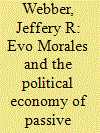

|
|
|
|
|
| Summary/Abstract |
While the government of Evo Morales rules in the name of indigenous workers and peasants, in fact the country’s political economy has since 2006 witnessed the on-going subjugation of these classes. If the logic of large capital persists, it is legitimated in and through petty indigenous capitalists. This article argues that Antonio Gramsci’s conceptualisation of passive revolution offers a superior analytical point of departure for understanding contemporary Bolivian politics than does Álvaro García Linera’s more widely accepted theory of creative tensions. However, the dominant manner in which passive revolution has been employed in contemporary Latin American debates has treated the socio-political and the ideological as relatively autonomous from the process of capital accumulation. What is necessary, instead, is a sharper appreciation of the base/superstructure metaphor as expressing a dialectical unity of internal relations between ‘the economic’ and ‘the political’, thus avoiding one determinism or another. Through a reading of Gramsci that emphasises such unity, this article interrogates the dynamics of ‘extractive distribution’, class contradictions of the ‘plural economy’, and transformations in the urban labour market which have characterised Bolivia’s passive revolution under Evo Morales between 2006 and 2015.
|
|
|
|
|
|
|
|
|
|
|
|
|
|
|
|
| 4 |
ID:
151643


|
|
|
|
|
| Summary/Abstract |
In the field of political theory, few authors have spurred intellectual tirades and triggered collective fantasy as much as the sixteenth-century Florentine Secretary Niccoló Machiavelli. Despite all controversies, in the discipline of International Relations (IR) Machiavelli and his The Prince have been almost exclusively associated with classical realism. This largely unchallenged association contributed to the edification of the myth of The Prince as the ruthless symbol of raison d’état, carrying transcendental lessons about the nature of politics and a set of prescriptions on how helmsmen should behave to seize, maintain, and reinforce their power. The realist hijacking of Machiavelli is at the core of the foundation of classical realism as an IR theory and its location at the very epicentre of IR as a discipline. This appropriation has, in turn, obscured alternative myths of The Prince, which depart from Machiavelli’s reflections on the Principati nuovi to read The Prince as a radical manifesto for political change. The opening of the semantic space in the field of IR – spurred by the so-called interpretive turn – offers an opportunity to break this monochromatic reading. This article delves into two competing myths of The Prince: the classical realist myth and Gramsci’s ‘progressive’ one to demonstrate its contested nature.
|
|
|
|
|
|
|
|
|
|
|
|
|
|
|
|
| 5 |
ID:
160880
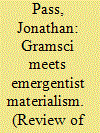

|
|
|
|
|
| Summary/Abstract |
Neo-Gramscians have made invaluable contributions to expanding traditional IR/IPE theory. Nevertheless, as the following article indicates, the ontological, epistemological, and methodological positions they adopt results in a rather one-sided interpretation of Antonio Gramsci and a partial, at times erroneous, account of the nature of the current global system. In highlighting these oversights, the neo neo-Gramscian approach presented here – rooted in a critical realist philosophy of science, specifically ‘emergentist materialism’, and involving a more complete reading of Gramsci – seeks to lay the basis for the elaboration of a more convincing theoretical and conceptual framework to analyse the changing dynamics of contemporary world order, without which the Coxian critical theory dream of engendering social emancipation cannot be fully realised.
|
|
|
|
|
|
|
|
|
|
|
|
|
|
|
|
| 6 |
ID:
178141


|
|
|
|
|
| Summary/Abstract |
Starting from a critique of the core thesis in Nazih Ayubi’s Over-stating the Arab State (1995) that Arab states are “feeble” because they lack “hegemony” in the Gramscian sense, this article postulates that rule based on coercion alone is not sustainable beyond exceptional periods. It shows how Arab regimes have been deploying the whole range of hegemonic tools, including buying consent (corruption) and artificially inflating it (fraud). Whereas Ayubi expressed the view that “feebleness” was both a reason and a further cause behind the Arab regimes’ inability to implement the neoliberal restructuring of their economies, this article maintains that it is an erosion in the hegemonic aptitude of regional governments due to the socioeconomic consequences of their implementation of neoliberal recipes that set the scene for the revolutionary shockwave of the Arab Spring. The article also shows how Arab regimes have reacted to the shockwave by an intensified resort to their traditional tools combined with the Hobbesian covenant on the backdrop of regional civil wars. Yet, as recent upheavals in Sudan and Algeria show, there also are limits to this legitimation stratagem.
|
|
|
|
|
|
|
|
|
|
|
|
|
|
|
|
| 7 |
ID:
103613
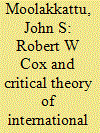

|
|
|
| 8 |
ID:
074960
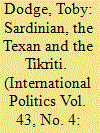

|
|
|
|
|
|
|
|